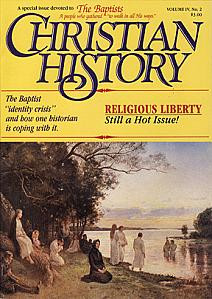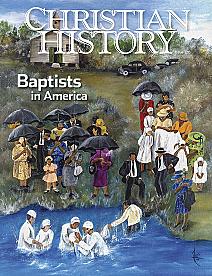The Baptists Won Randall and Then Rejected Him
BENJAMIN RANDALL, a New Hampshire lad, began praying in earnest when he was just five and remained true to his childhood faith as he grew up, attending church and reading his Bible daily. Rejecting his father’s wish that he become a sailor (he found shipboard life incredibly wicked), he became a sail-maker and tailor instead. Nonetheless, he felt his heart was not right with God.
When George Whitefield preached through New England in 1770, twenty-one year old Randall listened with skepticism. He considered the evangelist a divisive fanatic. However, when news arrived that Whitefield was dead, Randall was struck with a terrifying thought. “Whitefield is now in heaven, and I am in the road to hell. … He was a man of God, and I have reviled him, and spoken reproachfully of him. He has taught me the way to heaven; but I regarded it not...”
For two weeks, he cried to God for mercy. Not until he accepted Hebrews 9:26 (“…but he has appeared once for all at the culmination of the ages to do away with sin by the sacrifice of himself”), did he find relief. “Ah, it seemed if I had ten thousand souls, I could trust them all with Jesus. I saw in him a universal love, a universal atonement, a universal call to mankind, and was confident that none would ever perish, but those who refused to obey it.”
Randall thought the Congregational church that he attended lacked spiritual life. Reading the Bible, he concluded Baptist teaching was more accurate. He united with the Baptists and was re-baptized. A few years later, he accepted a pastorship with New Durham’s Baptists. Randall wasn’t there long before his people challenged him. They believed Christ died only for whoever would be saved. Randall thought the Bible taught the opposite, recalling the vision of his conversion experience. When the Baptists repudiated him, Randall answered, “It makes no odds with me, who disowns me, as long as I know that the Lord owns me.”
He organized a Free Will Baptist church at New Durham which preached that Christ died for all. Within five years, he had founded twelve more Baptist churches in New England, riding thousands of miles a year to win souls and guide churches—without pay. He met violent opposition, and once narrowly dodged a brick thrown at his head.
On this day, 22 October 1808, Randall struggled to breathe, dying of tuberculosis. Minutes before his death he whispered, “My soul is full of Jesus. I long to depart.” Grateful Free Will Baptists provided a pension for his widow.
—Dan Graves
----- ----- -----
For more on Baptists, read Christian History #6, The Baptists,
and Christian History #126, Baptists in America







